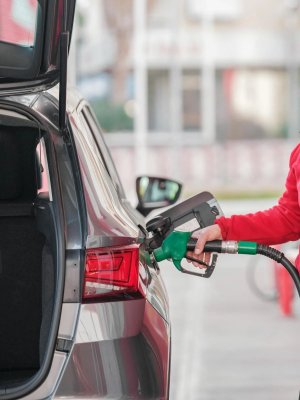Are gas stations charging you more than advertised? The credit card trick catching drivers off guard
By
Veronica E.
- Replies 0
If your recent stop at the gas pump left you wondering why your total seemed higher than expected, you’re not imagining it—and you’re not alone.
Across the country, more and more drivers are noticing that the price on the sign doesn’t always match the price on the receipt.
The reason? A growing number of gas stations are quietly charging up to $1 more per gallon when you pay with a credit card.
At The GrayVine, we believe in looking out for our community—especially when it comes to everyday costs that add up fast.
Here’s what you need to know about this increasingly common practice, how it works, and what you can do to avoid paying more than you should.

It starts with what seems like a good deal—an advertised gas price that pulls you in.
But once you swipe your credit card, the price per gallon jumps, sometimes by as much as a dollar.
Many stations are now posting only the lower cash price on their large roadside signs.
The higher credit price often isn’t revealed until you’re already at the pump—or worse, after you’ve started filling your tank.
This isn’t illegal, but it certainly doesn’t sit well with many drivers, who feel they’re being misled.
Credit card processing fees are to blame.
Every time you use your card, the station pays a percentage to the credit card company.
To cover those costs, some gas stations pass the fee onto customers by tacking on a “credit card surcharge.”
While this practice isn’t new, the amount of the surcharge has grown in recent years—and how it's disclosed isn’t always clear.
Yes, in most states, it’s legal for businesses to charge more for credit card transactions—as long as they inform customers clearly.
That’s where the problem lies.
Many drivers say the signage is hard to see or only shows up at the pump, leaving little time to reconsider once you’ve stopped the car and started pumping.
Frustrated drivers have been speaking out, especially on social media:
This trend is happening nationwide, but complaints are especially common in states where gas prices and taxes are already high.
According to Visualizing Energy, these are the top 10 states with the highest gas taxes (including local and federal excise taxes):
In these states, drivers are especially sensitive to even small added fees—because every cent counts.
Here are a few simple ways to protect yourself at the pump:
This issue isn’t just about money—it’s about trust.
Many drivers say they feel tricked when the price they expected changes after they swipe their card.
With inflation and cost-of-living concerns top of mind, even small surprises at the pump can create real stress—especially for people on fixed incomes.
Some have also voiced concerns about how the extra money is tracked and reported, though there’s no strong evidence of widespread misconduct.
Credit card surcharges are showing up in more places these days, from restaurants to dental offices.
While it’s legal in most states, many customers feel caught off guard.
One commenter summed it up: “It’s called a surcharge and everyone is starting to do it. If you don’t want to be charged, use your debit card or cash.”
Some consumers are calling for clearer laws that require stations to post both the cash and credit price up front, not just at the pump.
Others are simply choosing to take their business elsewhere.
And with gas price apps and community reviews, drivers have more tools than ever to find better options.
Read next: Shocking debt trap: How the Rule of 72 formula reveals the true cost of your credit card balance

We want to hear from you. Have you been surprised by a surcharge at the pump? Do you know of stations that are transparent and fair? Share your tips and experiences in the comments—because the more we talk about this, the more we help each other save.
Across the country, more and more drivers are noticing that the price on the sign doesn’t always match the price on the receipt.
The reason? A growing number of gas stations are quietly charging up to $1 more per gallon when you pay with a credit card.
At The GrayVine, we believe in looking out for our community—especially when it comes to everyday costs that add up fast.
Here’s what you need to know about this increasingly common practice, how it works, and what you can do to avoid paying more than you should.

Many drivers are discovering unexpected credit card surcharges at the pump. Image Source: Pexels / Engin Akyurt.
What’s going on at the pump?
It starts with what seems like a good deal—an advertised gas price that pulls you in.
But once you swipe your credit card, the price per gallon jumps, sometimes by as much as a dollar.
Many stations are now posting only the lower cash price on their large roadside signs.
The higher credit price often isn’t revealed until you’re already at the pump—or worse, after you’ve started filling your tank.
This isn’t illegal, but it certainly doesn’t sit well with many drivers, who feel they’re being misled.
Also read: Is AI about to take control of your credit card? What this credit card company has planned next will shock you!
Why does paying with a credit card cost more?
Credit card processing fees are to blame.
Every time you use your card, the station pays a percentage to the credit card company.
To cover those costs, some gas stations pass the fee onto customers by tacking on a “credit card surcharge.”
While this practice isn’t new, the amount of the surcharge has grown in recent years—and how it's disclosed isn’t always clear.
Is it legal?
Yes, in most states, it’s legal for businesses to charge more for credit card transactions—as long as they inform customers clearly.
That’s where the problem lies.
Many drivers say the signage is hard to see or only shows up at the pump, leaving little time to reconsider once you’ve stopped the car and started pumping.
Also read: Your credit card interest rates could change—here’s what you need to know
What drivers are saying
Frustrated drivers have been speaking out, especially on social media:
- “Had to 1-star a gas station I pulled up to that was $1 over their posted price with card,” one Facebook user wrote. “The sign at my pump (the only one that had one) said to come inside for your HUGE cash discount!”
- “I protest the extra charges,” another person said. “I tend not to participate with these establishments and I tell them so.”
- Pat Igo, who manages a trucking fleet in Florida, reported his fuel costs rising by thousands of dollars due to these unexpected surcharges.
Where is this happening most?
This trend is happening nationwide, but complaints are especially common in states where gas prices and taxes are already high.
According to Visualizing Energy, these are the top 10 states with the highest gas taxes (including local and federal excise taxes):
- California – $0.86 per gallon
- Illinois – $0.84
- Pennsylvania – $0.80
- Indiana – $0.74
- Washington – $0.70
- Michigan – $0.66
- Maryland – $0.65
- New Jersey – $0.60
- North Carolina – $0.59
- Virginia – $0.57
In these states, drivers are especially sensitive to even small added fees—because every cent counts.
Also read: $20 off your grocery bill every month? This credit card trick makes it easy
How to avoid paying extra
Here are a few simple ways to protect yourself at the pump:
- Check the signs carefully: Look for both cash and credit prices. If only one price is listed, ask whether there’s a surcharge for credit card use.
- Use cash or a PIN-based debit card: These often avoid the extra fee.
- Talk to the attendant: Don’t hesitate to ask what the total price will be before you pump.
- Stick with brands you trust: Some locations—like Shell or Marathon—may not charge the extra fee. Once you find a fair station, it’s worth returning.
- Use gas apps: Apps like GasBuddy can help you find nearby stations and compare prices, including payment methods.
Why drivers are frustrated
This issue isn’t just about money—it’s about trust.
Many drivers say they feel tricked when the price they expected changes after they swipe their card.
With inflation and cost-of-living concerns top of mind, even small surprises at the pump can create real stress—especially for people on fixed incomes.
Some have also voiced concerns about how the extra money is tracked and reported, though there’s no strong evidence of widespread misconduct.
Also read: Visa’s credit card overhaul: Are you ready for higher costs?
This trend goes beyond gas stations
Credit card surcharges are showing up in more places these days, from restaurants to dental offices.
While it’s legal in most states, many customers feel caught off guard.
One commenter summed it up: “It’s called a surcharge and everyone is starting to do it. If you don’t want to be charged, use your debit card or cash.”
Some consumers are calling for clearer laws that require stations to post both the cash and credit price up front, not just at the pump.
Others are simply choosing to take their business elsewhere.
And with gas price apps and community reviews, drivers have more tools than ever to find better options.
Read next: Shocking debt trap: How the Rule of 72 formula reveals the true cost of your credit card balance
Key Takeaways
- Some gas stations in the US are charging up to $1 more per gallon for customers who pay with a credit card, frustrating many drivers.
- While legal in most states, these surcharges are often poorly disclosed, leaving drivers feeling misled at the pump.
- Some consumers are choosing to avoid stations that charge extra, instead paying with cash or supporting locations that don’t add a fee.
- Credit card surcharges are becoming more common across industries—not just at gas stations—raising concerns about transparency and fairness.
We want to hear from you. Have you been surprised by a surcharge at the pump? Do you know of stations that are transparent and fair? Share your tips and experiences in the comments—because the more we talk about this, the more we help each other save.






